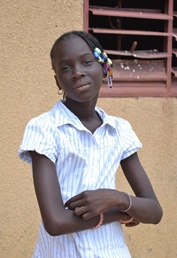By Ellen Johnson Sirleaf, President of Liberia, Special to CNN
 What factor has the power to transform individual lives, communities, nations and the world?
What factor has the power to transform individual lives, communities, nations and the world?
The answer to this complex question is a simple one: education. While it is widely accepted that there is no one solution to lift the millions across our globe out of poverty, it is also equally accepted that a key cornerstone of addressing some of the world's most pressing challenges is through providing a quality education to all children, especially girls.
Despite increasing numbers attending school in recent years, 126 million children remain out of primary school and the highest rate of girls not in school is across the African continent, where in sub-Saharan Africa nearly four out of five poor rural girls are not completing primary school.
It is unacceptable that in 2014 -- less than a year away from the deadline the international community agreed to get all children into school -- that 30 million girls in Africa are denied their basic human right to a quality education. Ensuring that every child goes to school, stays in school and learns something of value while there will require firm commitments and action by governments to invest in education and prioritize the education of its girls.
According to recent research, the estimated economic gain from achieving universal primary education exceeds the estimated increase in public spending required to achieve it. One extra year of schooling can increase an individual's earnings by 10%. Girls who complete a primary education are likely to increase their earnings by 5 to 15% over their lifetimes.
The power of education
Each additional year of schooling could raise average annual gross domestic product growth by 0.37%. If all women had a primary education, child marriages and child mortality could fall by a sixth, and maternal deaths by two-thirds. Investing in girls' education could boost sub-Saharan Africa's agricultural output by up to 25%.
Some countries lose more than $1 billion a year by failing to educate girls to the same level as boys. Without education, how can a country's future citizens take part in growing their economy and reap benefits? Without education how can a country grow?
Beyond increasing numbers
It is however, not good enough to only increase the number of children receiving education. Children and young people must learn basic knowledge, skills and competencies, such as reading, writing, critical thinking, problem solving and math, that are needed to live healthy, safe and productive lives.
Information on teachers, how to best support them to do their jobs, and information on how students are learning are crucial for knowing what policies and programs will be effective. By using our resources more effectively and focusing them on those children that are currently left behind, we can have some of the best educated citizens in the world -- citizens who will be responsible for building a peaceful and prosperous future.
By not investing in girls' education, we are telling our women that we do not care
Improving information available
Better information on learning outcomes and public spending is key to achieving our goals. These young people want a brighter reality and they demand that their governments stand up to meet their responsibilities and commitments, in order to build a future for their children, a future for their country.
When nearly 60 developing countries come together in Brussels at the end of June, as part of the Global Partnership for Education, they will be asked to commit to increase education spending. If they do, we will know if they have listened to these young people, and then the phrase, "Africa Rising," can be used in all truthfulness.

